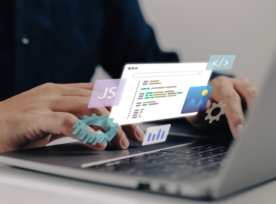The package allows the import and export of repository contents. You can use packages to install new content, install new features, change event content, and restore saved content for development. A package is a zip file that saves data stored in a serialized file system (called vault serialization) and provides an easy-to-use and maintainable representation […]
Technical
iCEDQ – An Automation Testing Tool
Data Warehouse/ETL Testing Data warehouse testing is a process of verifying data loaded in a data warehouse to ensure the data meets the business requirements. This is done by certifying data transformations, integrations, execution, and scheduling order of various data processes. Extract, transform, and load (ETL) Testing is the process of verifying the combined data […]
AEM Local Development With OpenJDK 11 and Maven 3.9.x
The official Adobe tutorial for setting up a local AEM development environment requests the reader to install Java JDK 11 for AEM 6.5 and above. It does not provide a download link for the Java JDK 11. If you were to do a quick Google search for “JDK 11 download,” you would be presented with […]
[Podcast]What If Semiconductors Were Gone for Just One Day? An Interview with Carolyn Henry of Intel
In our latest episode of “What If? So What?”, we dive deep into the world of semiconductors and the cutting-edge innovations being made at Intel. Host Jim Hertzfeld sits down with Carolyn Henry, vice president and general manager of America’s regional marketing at Intel, to explore the indispensable role of semiconductors in our daily lives. […]
Adobe Sites: Migrating from Webpack to Vite
Webpack is an amazing bundler for JavaScript and, with the correct loader, it can also transform CSS, HTML, and other assets. When a new AEM project is created via the AEM Project Archetype and the front-end module is set to general, Adobe provides a Webpack configuration to generate the project’s client libraries. Introducing Vite Vite […]
How Turso Brings Globally Distributed Databases Closer to Users
When we think about globally distributing an application to increase its performance, we usually consider deploying our front or back end in a serverless architecture, a CDN, or perhaps in an edge network. But, while these approaches work and give the expected results, we can go further and try to increase performance even more. What […]
Revolutionizing OpenAI Chatbot UI Deployment with DevSecOps
In the contemporary era of digital platforms, capturing and maintaining user interest stands as a pivotal element determining the triumph of any software. Whether it’s websites or mobile applications, delivering engaging and tailored encounters to users holds utmost significance. In this project, we aim to implement DevSecOps for deploying an OpenAI Chatbot UI, leveraging Kubernetes […]
How to Configure ServiceNow Knowledge Articles for Microsoft Search
If you use ServiceNow as your knowledge management platform, you might want to make your knowledge articles searchable and accessible from Microsoft Search. Microsoft Search is a unified search experience that helps you find what you need across your organization, including files, sites, people, and more. By connecting your ServiceNow knowledge articles to Microsoft Search, […]
Ultimate Guide to Setting Up Jenkins Server with DevSecOps Tools on AWS EC2.
In this blog post, I will guide you through the process of configuring a Jenkins server integrated with essential tools necessary for constructing a robust DevSecOps pipeline. This tutorial is designed for individuals with foundational knowledge of navigating the AWS console. Prerequisite: AWS Free Tier Account Step1: Jenkin Server Setup on EC instance and installation […]
How to Configure ServiceNow Catalog Items for Microsoft Search
If you are using ServiceNow as your IT service management platform, you might want to make your catalog items searchable in Microsoft Search. Microsoft Search is a unified search experience that helps you find what you need across your organization, including files, sites, people, and more. By connecting your ServiceNow catalog items to Microsoft Search, […]
Dev Tutorial: Building a Shared Navigation With Help from AEM Headless Services | Part 2
In part 1 of this series, I walked through the setup of a simple navigation component (HTL). This component’s model uses a service to provide a list of navigation link elements. This results in the author only needing to select a starting path, without having to add each link manually. What’s more, we set up […]
Part 2: Read and Validate PDF Text Content in Browser Using PDFBox and Selenium
Validating the content of PDF files that an application generates is a common task while testing web applications. To do this, utilize PDFBox, a Java library for managing PDF documents, in combination with Selenium, a potent web automation tool. This post will demonstrate how to use PDFBox and Selenium to read and validate PDF text […]











